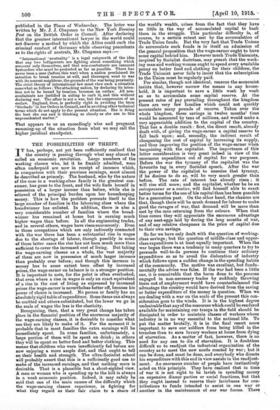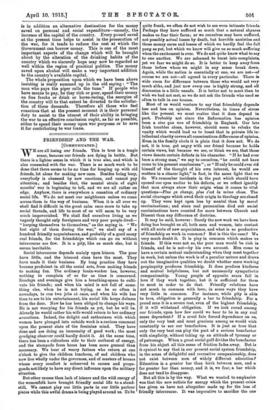THE POSSIBILITIES OF THRIFT.
TT has, perhaps, not yet been sufficiently realized that the country is passing through what may almost be called an economic revolution. Large numbers of the working classes who, let it be frankly admitted, were often underpaid are now in receipt of incomes which, in comparison with their previous earnings, must almost be described as princely. The husband, who by the nature of the case in a working-class family is the greatest con- sumer, has gone to the front, and the wife finds herself in possession of a larger income than before, while she is relieved of the principal burden upon her housekeeping money. This is how the problem presents itself to the large number of families in the labouring class where the breadwinner has enlisted. In addition, there is also a very considerable number of families where the bread- winner has remained at home but is earning much higher wages than before. In all the engineering trades, and in several others, wages have risen enormously. Even in those occupations which are only indirectly connected with the war there has been a substantial rise in wages due to the shortage of labour, though possibly in some of these latter cases the rise has not been much more than sufficient to cover the increased cost of living. But taking the wage-earning classes as a whole, the vast majority of them are now in possession of much larger incomes than probably ever before; and though this increase in money has to some extent been offset by increased prices, the wage-earner on balance is in a stronger position. It is important to note, for the point is often overlooked, that even where a rise in wages is only an exact equivalent of a rise in the cost of living as expressed by increased prices the wage-earner is nevertheless better off, because his power of choice is increased. No person or family has an absolutely rigid table of expenditure. Some items can always be omitted and others substituted, but the lower we go in the scale of wages the less is the elasticity.
Recognizing, then, that a very great change has taken place in the financial position of the enormous majority of the wage-earning classes, it is desirable to consider what use they are likely to make of it. For the moment it is probable that in most families the extra earnings will be immediately spent. In some families, unfortunately, a large portion of them will be spent on drink ; in others they will be spent on better food and better clothing. This means that children who were insufficiently fed before are now enjoying a more ample diet, and that ought to tell on their health and strength. The ultra-Socialist school will probably assert that this is a sufficiently good use to make of the increased earnings, and that nothing more is desirable. That is a plausible but a short-sighted view. A man or woman who is spending up to the hilt is always in a weak economic position. Indeed, it may safely be said that one of the main causes of the difficulty which the wage-earning classes experience, in fighting for what they regard as their fair claim to a share of the world's wealth, arises from the fact that they have so little in the way of accumulated capital to back. them in the struggle. This particular difficulty is, of course, to a certain extent met by the accumulation of Trade Union funds. But the very fact that Trade Unions do accumulate such funds is in itself an admission of the general proposition that the wage-earner ought to have some capital behind him. However much Trade Unionists, inspired by Socialist doctrines, may preach that the work- ing man and working woman ought to spend every available penny on better food and clothing for their children, the Trade Unionist never fails to insist that the subscription to the Union must be regularly paid.
For similar, though not identical, reasons the economist insists that, however narrow the means in any house- hold, it is important to save a little week by week so as to accumulate some capital reserve. At the present rates of pay prevailing throughout the kingdom there are very few families which could not quickly accumulate many pounds of reserve. Taken over the whole kingdom, these savings in twelve months' time would be measured by tens of millions, and would make a very appreciable addition to the capital of the country. That has a double result first, the direct result, already dealt with, of giving the wage-earner a capital reserve to fall back upon; and, secondly, the indirect result of cheapening the cost of capital by increasing its supply, and thus improving the position of the wage-earner vhen bargaining with the capitalist. The importance of this latter consideration is very great indeed in view of the enormous expenditure out of capital for war purposes. Before the war the tyranny of the capitalist was the favourite tag in every Socialist speech. After the war the power of the capitalist to exercise that tyranny, if he desires to do so, will be very much greater than before. The rate of interest has already risen ; it will rise still more; and the capitalist, whether he be an entrepreneur or a retailer, will find himself able to exact better terms for the use of his capital than has been possible for a generation past. On the other hand, the chances are that, though there will be much demand for labour to make good the ravages of war, that demand will be more than met by the men returning from the colours. When that time comes they will appreciate the enormous advantage of any nest-eggs laid by during the long months of war, and of any relative cheapness in the price of capital due to their own savings.
So far we have only dealt with the question of working- class savings ; but the question of midd/e.class and upper- class expenditure is at least equally important. When the war began there was a tendency in many quarters to try to persuade well-to-do persons to continue their ordinary expenditure so as to avoid the dislocation of industry which follows upon a sudden change in the spending habits of the community. The motive was excellent, but funda- mentally the advice was false. If the war had been a little one, it is conceivable that the harm done to the persons engaged in non-necessary trades by suddenly throwing them out of employment would have counterbalanced the advantage the country would have derived from the saving or better expenditure of the money in question. When we are dealing with a war on the scale of the present this con- sideration goes to the winds. It is in the highest degree undesirable that any of the resources which could be rendered available for maintaining our troops in the field should be dissipated in order to maintain classes of workers whose industry is in no way essential to the national life. To put the matter brutally, it is in the final resort more important to save our soldiers from being killed in the trenches than to save luxury workers at home from dying of starvation. As a matter of fact, however, there is no need for any one to die of starvation. It is doubtless difficult so to readjust the industrial organization of the country as to meet the new needs created by war ; but it can be done, and must be done, and everybody who directs his expenditure with this end in view assists in the readjust- ment. An enormous number of people have instinctively acted on this principle. They have realized that in time of war it is not right to be lavish in spending money on expensive dinner parties or social functions, but that they ought instead to reserve their lavishness for con- tributions to funds intended to assist in one way or another in the maintenance of our war forces. There
is in addition an alternative destination for the money saved on personal. and ROCial expenditure—namely, the increase of the capital of the country. Every pound saved at the present time helps to assist in the prosecution of the war, for it tends to reduce the cost at which the Government can borrow money. This is one of the most important aspects of the change which will be brought about by the alteration of the drinking habits of the country which we sincerely hope may now be regarded as well within the region of practical polities. The money saved upon alcohol will make a very important addition to the country's available capital.
The whole proposition upon which we have been above insisting is really summed up in the old saying : " The man who pays the piper calls the tune." If people who have means to pay, be they rich or poor, spend their money on fine frocks or drink or horse-racing, the energies of the country will to that extent be diverted to the satisfac- tion of these demands. Therefore all those who feel conscious that at the present moment it is their personal duty to assist to the utmost of their ability in bringing the war to an effective conclusion ought, as far as possible, either to spend their money upon war purposes or to save it for contributing to war loans.







































 Previous page
Previous page